Australia’s royal commission findings: Greed, dishonesty and widespread misconduct
Treasurer Josh Frydenberg has come under pressure in an interview with Leigh Sales, as a victims’ compo scheme will be launched after the royal commission’s “scathing” report, which could lead to criminal or civil charges.
Banking
Don't miss out on the headlines from Banking. Followed categories will be added to My News.
Treasurer Josh Frydenberg has come under pressure in an interview with Leigh Sales, who asked why the public should trust the Government to clean up the banks when they “had to be dragged” to the royal commission.
In an interview on ABC 730, Sales told him: “You said you’ll act on everything in this report. Given that’s 76 things that need fixing, was the Coalition wrong to strenuously oppose a royal commission into the banks for as long as it did?”
Mr Frydenberg replied, saying: “Look, we can debate for hours, Leigh, what Labor failed to do when they were in office.”
She then told him: “I’m asking about you. You were in office I’m asking about you.”
Mr Frydenberg then replied, saying: “When we first came into office we initiated David Murray’s financial systems inquiry, a very significant inquiry that looked at the financial system and the recommendations of which we’ve been implementing since.
“We’ve adopted a number of important reforms that have been endorsed, not just by Commissioner Hayne today, but by previous reports including by the Productivity Commission into superannuation.”
Sales then asked him “why should the public trust this Coalition Government to clean up the banks when you had to be dragged to that inquiry in the first place?”
He said: “Well, we did call the royal commission and today we’ve responded to it.”
She didn’t let up, saying: “You did have to be dragged to it.”
DAMNING REPORT: A five-minute guide on the Commission’s findings
BAREFOOT INVESTOR: Scott Pape explains banking report
OPINION: Australia’s banks need to do better
MORE: Ten new court judges to deal with banking criminal cases
.@leighsales: Was the coalition wrong to strenuously oppose the #bankingrc for as long as it did?@JoshFrydenberg: Oh we can debate for hours what Labor failed to do-@leighsales: -No, I’m asking about you. @JoshFrydenberg: I’m looking to the future. #auspol #abc730 pic.twitter.com/v73q8Ur9O6
— abc730 (@abc730) February 4, 2019
He fought back, saying: “And today we have said we’re taking action on all 76 recommendations.
“These are recommendations that will have far-reaching consequences across the financial system, including putting in place the banking executive accountability regime, not just within banks which we initiated, but with an insurance and superannuation companies, ensuring trustees of superannuation funds actually face penalties for breaching of their duties.
“Putting in place a new disciplinary body that deals with financial advisors. There’s a whole series of recommendations that Commissioner Hayne has handed down which we have adopted today.”
Earlier, Mr Frydenberg declared Australia’s banking sector “must change forever” after the royal commission’s “scathing” final report was made public today, almost a year after hearings began.
The report is set to trigger a dramatic overhaul of the nation’s financial services industry to deliver customers fairer and simpler products which will leave them better off.
Commissioner Kenneth Hayne made 76 recommendations in his report and referred 24 cases of misconduct to the Australian Securities and Investments Commission and Australian Prudential Regulation Authority for further investigation, including all the major banks except for Westpac.
This could lead to criminal or civil charges.
Treasurer Frydenberg has vowed the government will take action on all the recommendations, including launching a redress scheme of “last resort” for Australians who have suffered from banking misconduct.

Mr Hayne was scathing of banking executives and boards in his report and singled out National Australia Bank chief executive Andrew Thorburn and chair Dr Ken Henry in particular.
“There can be no doubt that the primary responsibility for misconduct in the financial services industry lies with the entities concerned and those who managed and controlled those entities: their boards and senior management,” he said.
“The amounts of money that just ‘fell into the pocket’ of so many large and sophisticated financial entities, the number of times it happened, and the many years over which it happened, show that it cannot be swept aside as no more than bumbling incompetence or the product of poor computer systems.”
Mr Frydenberg echoed the remarks, saying: “From today, the banking sector must change and change forever.”
Speaking in parliament after the report was handed down, he said it was a “scathing assessment of conduct driven by greed and behaviour that was in breach of existing law and fell well below community expectations”.

Commissioner Hayne’s report, delivered in three detailed volumes today, also contains what could potentially be a fatal blow for the mortgage broking industry.
The most significant recommendations to follow seven rounds of public hearings over 68 days, the appearance of more than 130 witnesses and review of over 10,000 public submissions, are:
— A ban on “hawking” — the unsolicited offer or sale of superannuation should be prohibited for both insurance products and super products.
— the referral to regulators of AMP, the Commonwealth Bank, National Australia Bank, and others.
— a home-loan borrower, not the lender, is to pay the broker a fee for acting in connection with home lending. The government has not committed to acting on this in full, but Labor likely will.
— financial advice fee arrangements must be renewed annually by the client after being provided, in writing, with the precise services being received and the total cost.
— changes to ensure a person has only one default superannuation account. This account is where an employer must pay the employee’s super contributions unless told otherwise.
— A new authority independent of the Government to oversee the prudential regulator, the Australian Prudential and Regulation Authority and the corporate cop, the Australian Securities and Investments Commission.
‘TOUGH MEDICINE’
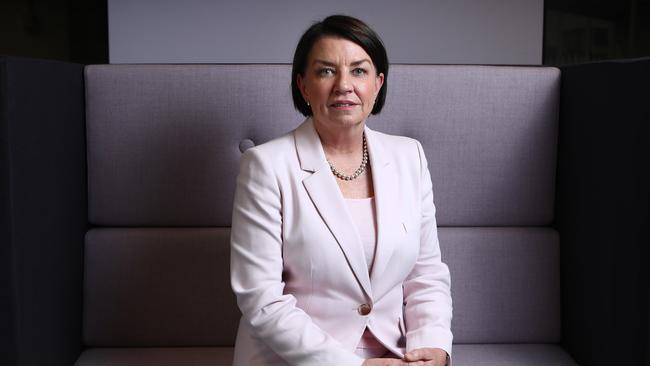
Despite criticism that the report isn’t as tough as expected, Australian Banking Association chief executive Anna Bligh says it contains some “very tough medicine” for banks.
Speaking in parliament today, she said banks were “sorry for the pain they have caused” to “far too many customers” but dodged questions about the commissioner’s criticism of NAB’s chairman and CEO.
“Banks are determined to learn the lessons, to fix the problems and to make it right,” she said. “Australians expect better from their banks and, more than that, they deserve better.”
Banks have formed a “special taskforce” to help implement changes and view the report as a road map, Ms Bligh said.
GOVERNMENT’S RESPONSE
A compensation scheme will be established for Australians affected by banking misconduct, Mr Frydenberg said.
This will include redress for almost 300,000 consumers who had were never paid but were found to have suffered from misconduct.
This cohort will receive about $30 million collectively in compensation.
Separately, the Australian Financial Complaints Authority will be able to make binding determinations compelling industry to pay redress of up to $500,000 for individuals, $1 million for small businesses and $2 million for agribusinesses under the “compensation scheme of last resort”.
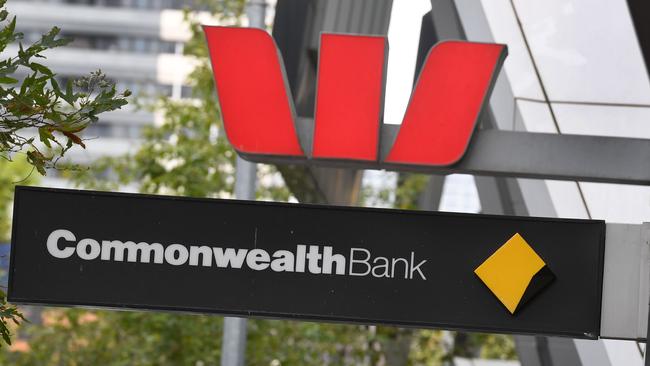
Other actions the government will take include:
— Extending the bank executive accountability regime to the insurance and superannuation sectors, meaning executives will be held personally responsible for conduct that occurs on their watch
— Trustees and directors in the super sector will also be subject to civil penalties for breaches of their duties
— A new system of discipline for financial advisers will be put in place with stronger industry reference checking, greater reporting of serious compliance concerns, and a new single disciplinary body, which all advisers must be registered with
— The Federal Court’s jurisdiction will be extended to cover corporate criminal misconduct.
— “Hawking” for superannuation and insurance will be banned, meaning companies will no longer be able to contact Australians to spruik products
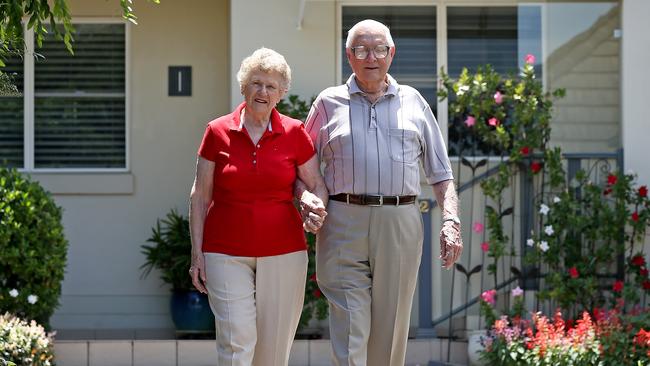
— Changes will be made to the sale of add-on insurance products, so they can’t be sold until after a period of time from the original product
— A new national farm debt mediation scheme will be launched, where banks will be required to ensure distressed farm loans are managed by people experienced in agriculture and receivers will only be appointed as a remedy of last resort
— Banks will not be allowed to charge default interest on agricultural loans where a drought or national disaster has been declared
— The valuation of agricultural land will also need to be independently determined from the lending processes
— On superannuation, the government will ensure new fund members only have one account and ban the deduction of advice fees from MySuper accounts
— Ending grandfathering of conflicted remuneration for financial advisers, effective from January 1, 2021
— For mortgage brokers, the government will launch a “best interest duty”, banning trailing commissions and volume based bonuses on new loans from July 1, 2020
— There will be a review in three years of moving to a borrower-pays remuneration structure
— A new three-person oversight body will be established for watchdogs ASIC and APRA to “monitor their performance and effectiveness and report to government”.
— A “capability review” of APRA will begin shortly
TO PREVENT FUTURE MISCONDUCT
In his report, Commissioner Hayne backed Treasury’s observation that if appropriately managed, ensuring the industry consistently met the requirements of existing laws would likely enhance the economy rather than detract from it.
“The financial services industry is too important to the economy of the nation to allow what has happened in the past to continue or to happen again.”

‘DARK DAY FOR BANKS’
Labor has accepted all of Commissioner Hayne’s recommendations in principle.
Shadow Treasurer Chris Bowen said today the Opposition regarded the report as “the minimum of action that should be taken to improve Australia’s banking and financial services sector”.
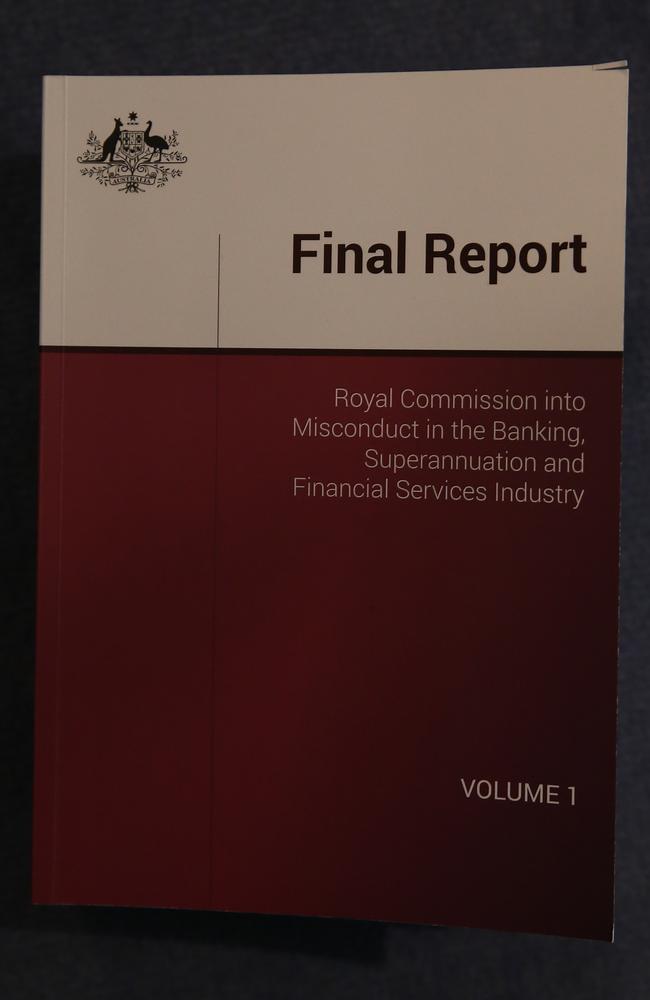
He added that today was a “dark day” for Australia’s banks, while slamming the Coalition government for not launching the royal commission earlier.
“This is a sobering report,” Mr Bowen told reporters in Melbourne.
He also called for the commission’s referrals regarding misconduct to be “followed through” by regulators in full.
Earlier, former prime minister Tony Abbott said the inquiry had exposed horrific conduct by banks and their staff and that should not go unpunished.
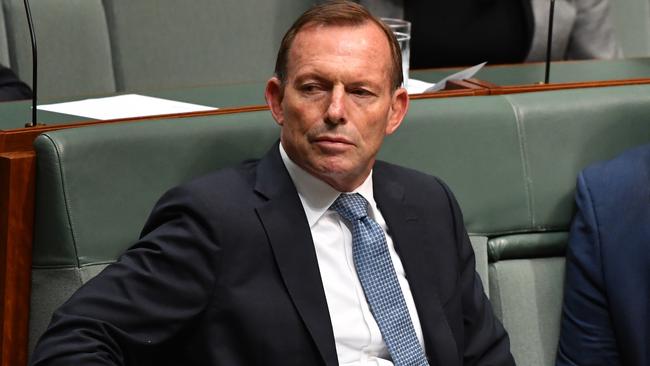
But that didn’t mean the whole system was rotten, he added.
“In this era when no one ever takes personal responsibility for anything, when something goes wrong we assume it’s a systemic fault as opposed to an individual’s fault,” he told 2GB radio.
“What I don’t want to do is to see the system gummed up by a whole lot of additional regulation rather than see the people who have actually done the wrong thing being appropriately punished.”
Influential Senate crossbenchers Pauline Hanson and Derryn Hinch said criminal charges should be laid against those found to have done the wrong thing.
“Somebody has to face criminal charges here because some of the actions were absolutely unconscionable,” Senator Hinch told Seven’s Sunrise program, while Senator Hanson said there should be jail sentences.
To read the full financial services royal commission report click here.
Originally published as Australia’s royal commission findings: Greed, dishonesty and widespread misconduct
